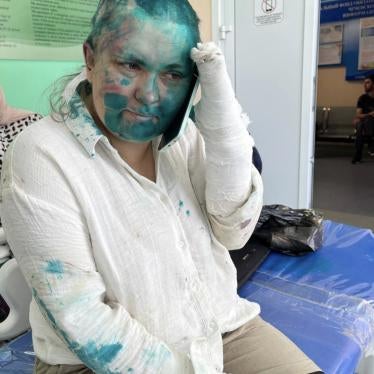Torture in both official and secret detention facilities is widespread and systematic in Chechnya, Human Rights Watch said in a briefing paper issued today, just as the UN Committee against Torture concluded its review of Russia.
“If you are detained in Chechnya, you face a real and immediate risk of torture,” said Holly Cartner, Europe and Central Asia director at Human Rights Watch. “And there is little chance that your torturer will be held accountable.”
Human Rights Watch said that its documentation of more than a hundred cases of torture, taken together with research conducted by leading Russian human rights groups, strongly suggests that torture in Chechnya is commonplace. Human Rights Watch also said that this finding, together with de facto impunity for torturers, strongly suggests a widespread and systematic practice of torture in Chechnya.
The 16-page briefing paper, “Widespread Torture in the Chechen Republic,” is addressed to the Committee against Torture. It documents ill-treatment and torture by pro-Moscow Chechen forces under the effective command of Prime Minister Ramzan Kadyrov, as well as by federal police personnel.
In research missions conducted in April and September of 2006, Human Rights Watch documented 82 cases in which Kadyrov’s forces detained and tortured people, most of them in unlawful detention facilities. Researchers also obtained detailed descriptions of at least 10 such facilities, most of which are private houses owned or used by regional commanders loyal to Kadyrov.
“If you detain someone secretly, it’s a lot easier to abuse them,” said Cartner. “This is illegal under Russian and international law.”
Kadyrov’s forces use torture to get information about rebel forces. Some detainees are released, and others are forced to join Kadyrov’s ranks. Kadyrov’s forces have also taken hostage and mistreated relatives of alleged rebel fighters.
Human Rights Watch also documented numerous cases in which personnel of the Second Operational Investigative Bureau (ORB-2) of the Russian Federal Ministry of Interior tortured detainees in official places of detention.
Detainees described being subjected to electric shocks and severely beaten with boots, sticks, plastic bottles filled with water or sand, and heavy rubber-coated cables; some also said that they were burned. In addition, a number of interviewees told Human Rights Watch about psychological pressure, such as threats or imitation of sexual abuse or execution, as well as threats to harm their relatives.
Very rarely do authorities make efforts to punish anyone for these abuses.
In cases when victims dare to launch a formal complaint, prosecutors refuse to open an investigation, and courts disregard the defendants’ allegations of torture, even when they are supported by medical records or witness testimony. Human Rights Watch said it is aware of only one case in which an official was convicted for physically abusing someone in custody.
The climate of impunity is worsened by the authorities’ persistent efforts to close Chechnya to outside scrutiny and prevent documentation of abuses. Last month, Russia refused to allow the UN special rapporteur on torture to conduct unannounced visits and meet with detainees in private, forcing him to postpone his visit to Russia and Chechnya indefinitely. Such conditions are standard for the special rapporteur’s visits around the world.
Human Rights Watch urges the UN Committee against Torture – the world's leading human rights body tasked with holding countries accountable for torture and ill-treatment – to send Russia a clear message that it must stop, punish and prevent future acts of torture.
“The Committee must use the opportunity of its review to call on Russia to take concrete steps to stop the practice of torture, including investigating and bringing the perpetrators to justice, and providing redress for the victims,” said Cartner.
Human Rights Watch also called on Russia’s international partners, including the EU, which will hold its twice-yearly summit with Russia on November 24, to make the committee’s recommendations an integral part of its bilateral relationship with Russia. They should also press for adequate and timely implementation.
Testimonies
“They beat me mercilessly. They put me against the wall with my legs spread apart and kicked me on my privates – I later saw that the entire area in between my thighs was all black from bruises. They pulled my pants down and threatened to rape me. I kept telling them, ‘Just kill me!’ but they said, ‘No, we won’t kill you right away – we’ll do it slowly, and we will also rip your brother apart.’ I felt like during these interrogations I was dying over and over again, and they would revive me to continue.”
“Sulim S.”(not his real name), detained together with his brother “Salambek S.” (not his real name) by the ORB-2 personnel in March 2006.
“They started kicking me, and then brought an ‘infernal machine’ to give me electric shocks. They attached the wires to my toes and kept cranking the handle to release the current. I couldn’t bear it. I was begging: ‘Give me any paper – I’ll sign it, I’ll sign anything.’”
– “Khamid Kh.” (not his real name), detained at a unofficial detention facility by Kadyrov’s forces in April 2006.







